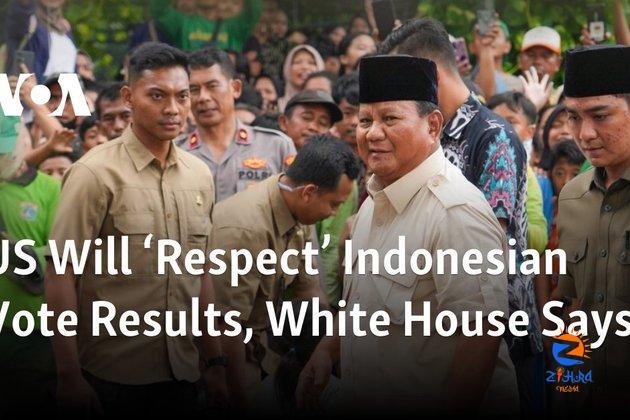
[ad_1]
white house – The White House said Thursday that it would accept the results of Indonesia’s presidential election in which Prabowo Subianto, a former army general who for more than a decade was banned from entering the United States because of allegations linked to human rights abuses, has claimed victory.
“We’ll make our congratulations known at the appropriate time. I couldn’t give you a date certain or time certain for that because I understand that the results are still coming in,” John Kirby, national security communications adviser, said to VOA during a White House briefing. “We will respect the vote and the voice of the Indonesian people.”
Preliminary counts from several survey institutions showed that Prabowo, who like most Indonesians goes by his first name, outperformed rivals Anies Baswedan and Ganjar Pranowo, securing more than 50% of votes – the threshold to avoid a runoff election.
The official tally from the General Election Commission is set to be released next month. But Prabowo has claimed that he’s won, telling thousands of his supporters in the capital, Jakarta, that this was “the victory of all Indonesians.”
In 2020, the Trump administration dropped the de facto ban on Prabowo’s entry into the United States that was imposed over accusations of human rights abuses, including the abduction and torture of pro-democracy activists during the 1998 ouster of his then- father-in-law, President Suharto, and involvement with military crimes in East Timor.
Pressed by VOA on whether the Biden administration was comfortable with Prabowo’s track record, Kirby underscored that human rights have been “the very foundation” of Biden’s foreign policy.
‘There’s not a conversation he has anywhere in the world with foreign leaders where he’s not raising issues and concerns about human rights and civil rights,” he said. “That’s not going to change.”
Prabowo has promised to continue the widely popular policies of outgoing President Joko Widodo. Jokowi, as he is often called, governed with an “economy-first” modernization agenda that has brought rapid gross domestic product growth, ushering Indonesia, the world’s fourth most populous country, into the ranks of middle-income countries.
Jokowi defeated Prabowo in previous elections, but this year signaled support for his former rival through his eldest son, Gibran Rakabuming Raka, 36, who ran with Prabowo as vice president.
Gibran was able to join Prabowo’s ticket only after the country’s constitutional court created an exception to a rule that candidates must be at least 40 years old. That fueled criticism that Jokowi was trying to create a political dynasty in the world’s third-largest democracy.
Those concerns will largely be overlooked by Washington, considering Indonesia’s pivotal role in the U.S. geopolitical contest for influence with China and international efforts to mitigate climate change. Indonesia is the biggest exporter of coal and claims the world’s biggest reserves of nickel, a key component of electric car batteries.
“If the results show a Prabowo victory next month, then I would expect the U.S. to treat Minister Prabowo the same way that it treated Indian Prime Minister Narendra Modi after he was elected in 2014, waiving any remaining restrictions on engagement with him,” Aaron Connelly, research fellow at the International Institute for Strategic Studies, told VOA.
Biden welcomed Modi for a glitzy state visit at the White House last year. The president’s embrace of the autocratic-leaning Hindu nationalist, whose government has overseen a crackdown on press freedom and opposition leaders, has been criticized by lawmakers and activists who say the administration is prioritizing geopolitical expediency over human rights.
Just as with India, which Washington sees as a counterweight to China, the United States is keen to foster closer ties with Indonesia, home to the largest Muslim population in the world and an important voice of the Global South.
For months, Jakarta and Washington have been discussing a potential minerals partnership aimed at facilitating nickel trade. Indonesia’s nickel mining and refining industry has been largely dependent on investment from Chinese companies and besieged by environmental concerns, hence limiting its access to the U.S. market.
[ad_2]